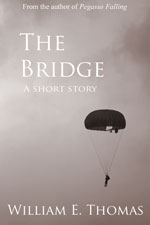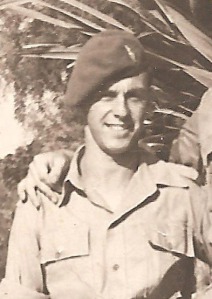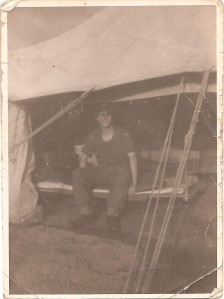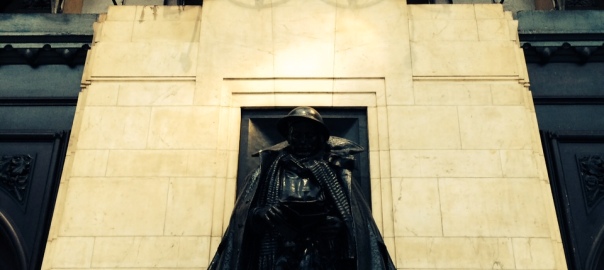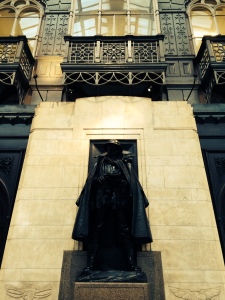This week marks the 70th anniversary of the Battle of Arnhem. To commemorate the occasion, we are serialising William’s short story, The Bridge, which is set against the backdrop of the infamous battle, which took place between 17th and 26th September 1944.
ADVISORY: This story contains adult themes and occasional strong language.
THE BRIDGE: PART 5
‘Are those people waving at us, Bill?’
He looked in the direction she indicated and saw that the man and woman he had seen in the window were now standing at the gate of the house. They were smiling and the man beckoned them over. As they began to cross the road, he opened the gate and came toward them.
‘Good morning. May I apologise for the state of our roads. I think you will be here for a long time.’ He spoke very good English but with that heavy Dutch accent. ‘My wife wondered if you might like to join us in a cup of coffee, or tea if you would prefer it?’
‘Oh, how very kind, we’d love to. My husband never refuses a cup of tea, do you Bill?’
He seemed not to hear but stared intently at the woman.
‘Bill?’
‘What? Oh, yes, thank you. You’re very kind.’
The woman was still standing at the gate, smiling. She stood aside to let them through. ‘Come in, please,’ she beckoned. ‘Welcome to Oosterbeek and to our house. Would you prefer to come inside or perhaps you would like to sit on the stoop?’
‘I’d love to see inside, if I may. You have such a beautiful house.’
‘Ah, the woman’s curiosity. I know exactly what you mean. Come in, please. Per, let’s go through to the kitchen, it’s friendlier there.’
The man lead them into a large, bright room, sumptuously equipped with every modern convenience.
‘Oh, it’s beautiful!’ She emphasised the first syllable heavily and gazed around the room wide-eyed, like a child in a toy shop. ‘Look at that Aga, Bill. I bet you’re green with envy. My husband loves to cook and he’s always wanted one of those. What do you think, Bill? Isn’t it gorgeous?’
He looked around the room, a puzzled expression on his face. ‘It’s different.’
The Dutch couple exchanged glances.
‘Bill, don’t be so rude. It’s gorgeous. Don’t mind him. I think the journey has made him grouchy.’
‘How is it different? He said it was different,’ the man asked, quizzically.
‘It’s just an expression, colloquial, it’s what you say when you don’t really like something. It doesn’t mean different like in not being the same.’
The man smiled. ‘So, you don’t like modern fittings? You prefer the old fashioned traditional Dutch kitchen furniture? Well, I’m with you there, this is my wife’s idea.’
‘You don’t have to work in it, Per.’
‘Look, I’m sorry. I didn’t mean to be rude. Forgive me, this is a wonderful kitchen, really. We have been so overcome by your kindness we have forgotten our manners. Allow me to introduce myself. William Grant, and this is my wife Shirley. We are from London.’
‘Pieter Van Der Aar, and this is Druschke, my wife. To our friends we are known as Drush and Per. Please feel free to call us so if you wish. I notice your wife calls you Bill, that is for short, yes? And how are you called for short, Shirley?’
‘Just Shirley. None of the diminutives seem to work, so I don’t bother. I must say, Pieter Van Der Aar sounds impressive. I’m sure I’ve heard the name before, though.’
‘It’s almost the Dutch equivalent of Smith, Shirley. It means “of the water” in old Flemish. I think we must have been the original boys with our fingers in the dyke.’
‘And you speak such wonderful English, both of you.’
‘Well, as one of your compatriots said to me once, “Who else speaks bloody Dutch?”’
The four of them continued this banter for some time, laughing at each other’s jokes and asides and appearing for all the world like people who had known each other for years. Shirley was completely at ease as though at home, extrovert, talkative. Per appeared captivated by her and was enjoying himself immensely. The two of them seemed to relate. Bill and Druschke were more subdued.
‘Per, go and see what is happening outside with the traffic. See if it’s clearing.’
He crossed over to the window and looked out. Shirley rose and joined him.
‘It does seem to be moving slowly. What do you think, Per?’
‘Very slowly indeed, I’m happy to say. One lane of the bridge is still blocked.’
Everybody laughed as Shirley gave him a playful shove.
‘You have a beautiful garden, Per. Do you do it all yourself?’
‘Would you like to see the gardens?’ Druschke interrupted. ‘Per, why don’t you show Shirley your precious fruit trees?’
‘Shirley?’
‘Oh, yes please, Per. Bill, do you want to come?’
‘You go ahead, love. I’ll stay here with Mrs Van Der Aar.’
The two left, chatting noisily to each other.
‘They seem to get on like two old friends.’
‘She’s always the same. Born mixer, our Shirley. Irrepressible.’
‘Do you have children, Bill?’
‘Oh God, yes, masses of them. And grandchildren. We are quite a tribe.’
‘You’re teasing me again.’
They sat for what seemed an age, just looking at each other across the table. She was still very beautiful. Her pageboy hair, full about her face, was now tinted with traces of silver. He wanted to speak but the lump in his throat made him mute. He saw that she too had tears welling up in her eyes.
‘Well, Mr Grant.’
He swallowed painfully. ‘Well, Mrs Van Der Aar.’
She began to cry, the tears running down her face. He leaned forward and gathered up her hands in his.
‘Oh, Tommy. Tommy, I thought you were dead. All these years I thought you were dead and I have tried to forget you. Not at first. Oh God, I thought I would die when they took you away. My parents knew how much I loved you and they were wonderful. They admired you very much and Per, loyal old Per, he was a rock to me and always promised to care for me. And he did, you see. He still does. I never thought I would bear your loss. But time healed. It always heals, but I didn’t forget you, Tommy. I couldn’t forget you.’
She looked up and in her tear-wet face, he saw the girl he had so desperately loved. He fumbled in his pocket for a handkerchief then leaned across and began to wipe her face and eyes. She took the handkerchief from him and rolled it tightly in her hands. As she looked more deeply into his face, she saw his chin quiver slightly. He swallowed deeply and looked away.
‘Why did you come back, Tommy? Why didn’t you stay in your grave? Oh God, no, oh forgive me, please. I didn’t mean that. I don’t know what I’m saying. But why? Why did you have to come back here?’
They heard the other two coming up the garden toward the house. She stood up and, sniffing loudly, began to wipe her nose and mouth with the back of her hand. She was still clutching his handkerchief.
‘Why don’t you use the hanky, Drush? It’s in your hand.’
She smiled and exhaled a short sobbing laugh. She dabbed at her eyes and nose, then turning quickly, she left the room.
‘Oh, Bill, you should see the garden. It’s huge. Lots of beautiful fruit trees and bushes and there is a great big tree down by the stream with seats under it.’
‘Yes, I know.’
She regarded him, head on one side and an enquiring frown began to gather her brow. Per intervened quickly.
‘Where is Druschke?’
‘I’m not sure. I believe she went upstairs. Look, as much as I hate to say this, the traffic appears to be moving again and we really should be on our way.’
‘Of course, I’ll fetch Drush.’ He went to the door and called up the stairs. ‘Drush, Drush darling, our friends are leaving now. We must wish them on their way.’
As they moved into the hall, they saw her descending the stairs. Per could see she had been crying, her eyes were puffed and red, despite her efforts to conceal this with makeup.
‘What’s the matter, love? Have you got something in your eyes?’
‘No, Shirley, I’m fine. Just a touch of hayfever. It’s always worse in the fall. So, you are on your way at last?’
They left the house and crossed the road to gather by the car.
‘Nice auto, Bill. But the wheel’s on the wrong side, I see.’
‘That’s right, Per. But you know us Brits, the only ones in step. Druschke, Per, what can we say? You have been so kind, we really hate to leave but we still have a way to go.’
‘Where are you heading?’
‘Bielefeld, to visit our daughter. Army wife, you know.’
‘Ah, so.’ They shook hands. ‘Shirley, it’s been a pleasure. But it must be goodbye, yes?’ Per held out his hand.
‘Oh no you don’t. I never leave without a cuddle, especially from large, handsome men.’
Druschke shook her head in amused disbelief. ‘You are right, Bill. She is irrepressible.’ The two women embraced warmly. ‘Shirley, please come and see us again.’
She then turned to him and he looked at her as he had once before, so long ago.
‘Goodbye, Druschke.’
She took his hand in both of hers and, leaning forward, kissed him softly on the cheek. ‘Goodbye, Tommy. Don’t forget us, please.’
Without raising his head, he whispered so only she could hear. ‘I could never forget you, Drush.’
‘You called him Tommy. Why Tommy?’ asked Shirley, perplexed.
‘It’s our name for all the British soldiers, Shirley. It’s from your Rudyard Kipling. You know, The Ballad of Tommy Atkins, the immortal sergeant.’
They watched the car until it disappeared into the traffic across the bridge.
‘Are you alright, Drush?’
‘Yes, thank you Per. Yes, I’m fine now.’
They turned and walked slowly up the path back to the house, closing the door behind them.
They were on the ring road now, heading for the autobahn.
‘Look, Bill. Look at that road sign.’
‘What about it?’
‘It says Arnhem, six kilometres.’
‘That’s right. That’s it over there, all those tall buildings.’
It became clear to her now. His strange behaviour at the house and the way that woman had looked at him and spoken to him and referred to him as a soldier.
‘That bridge we just crossed…was that your bridge?’
He made no reply. He stared at the road ahead, strangely silent, almost in a reverie. She looked at him intently, uncertain of her feelings.
‘Did you know that woman, Bill?’
Still silent, he glanced up into the mirror at the receding skyline and the bridge. He felt at peace, content at last. A harrowing episode in his past had now been purged. He would never again look back in anger at the Pyrrhic arrogance of those who sent them there to die, or rage at the atavistic stupidity of those tribal old men who gathered annually to celebrate the carnage. He would now only recall that for a brief and precious moment, a sensitive, desperate boy had found solace and hope in the selfless love of a beautiful girl.
‘No love, I didn’t know that woman…but I knew a girl here once.’
She placed her hand on his leg and gave it a gentle squeeze. Then, taking a tissue from its box, she wiped away his tears.
‘Soon be there, love. I’m looking forward to seeing the kids.’
He nodded and quietly cleared his throat.
‘Me too.’
—–
